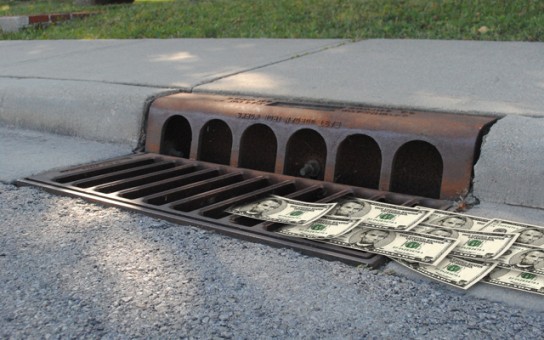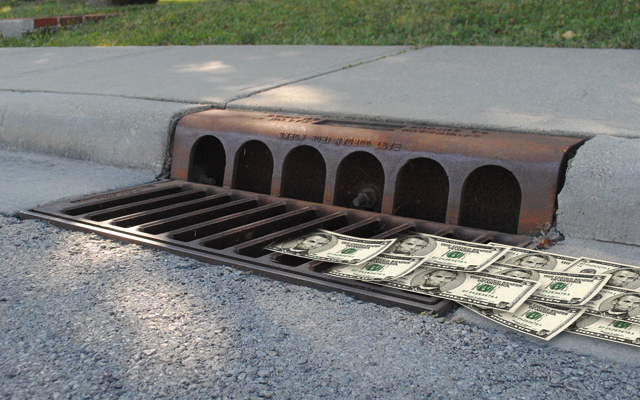
By Pete Smith
After nearly a year’s worth of discussions, the city council appears poised to vote on whether to approve the creation of a new stormwater utility for Carmel.
In its final incarnation, the utility would charge homeowners a fee of $4.95 per month to pay for stormwater infrastructure upgrades and repairs to prevent flooding issues. Businesses, apartment complexes, churches and nonprofits would pay an assessed monthly fee based on the amount of impervious surface on each property.
In its first year, the utility would also offer a series of incentives for improvements to homes that install runoff prevention measures such as rain barrels or swales. But act quickly, because other stormwater utilities throughout the state have seen little use of incentive programs and they are often canceled, city engineer Jeremy Kashman said.
The new stormwater utility is expected to generate between $2.9 million and $3.2 million in revenue per year, and council sponsors Luci Snyder and Kevin “Woody” Rider have been adamant that those funds be protected so that they can’t be allocated for uses other than stormwater infrastructure upgrades.
The concern was so great that council president Eric Seidensticker said he hired Carmel law firm House Reynolds & Faust to review the final version of the ordinance and resolution to ensure the protections were ironclad.
Because the proposed stormwater utility would operate with only two new employees and rely almost entirely on existing city employees, there was concern that those existing employees’ salaries could be funded with the new stormwater revenues and deplete the funds available for projects while freeing up general fund money available for other uses.
To prevent this scenario, councilors voted in a special meeting of the Utilities, Transportation and Public Safety Committee to require that the city council had to pre-approve all planned stormwater projects a year in advance and that only 20 percent of stormwater utility revenue could be used on overhead expenses.
The council also wants to approve all stormwater projects when the utility’s budget is approved so that it can ensure how the fund will be allocated.
The council had considered creating a special board to oversee the utility, but it feels with the proper protections that it can allow the Board of Public Works to manage it on a day-to-day basis.
The discussions
Councilors did not take the idea of charging Carmel residents a stormwater fee lightly.
For the past year they have analyzed the most equitable way to charge homeowners and businesses for the runoff from property and streets while getting the most bang for the buck.
The councilors considered multiple methods to individually assess each property to make sure than any fee charged was equitable.
But the difficulty with individual property analyses is that they are labor intensive – even when using GIS techniques. And that workload only increases each time a property is modified.
City council members tasked with the decision eventually concluded that too great a share of the new revenue generated would be eaten up by administration and overhead costs which is why residential properties will pay a flat fee.
How to assess apartments – whether individually as residences or lumped together by the ownership company – received the majority of the discussion time.
The councilors had at one point voted to charge all apartment dwellers a flat $4.95 fee per month – the rationale being that they contributed a greater proportion of traffic to Carmel’s streets. (Street-sweeping is part of the stormwater utility’s responsibility.)
But a sustained lobbying effort by an apartment owners association and its lawyer eventually persuaded the council to treat those complexes as commercial property.
Unfunded mandate
The utility’s creation is also part of the city’s efforts to keep up with EPA regulations regarding water quality.
The federal agency is seeking to clamp down on chemicals that run off from lawns and roadways and end up in nearby streams and rivers – two of the biggest concerns are E. coli bacteria and excess phosphorous from lawn treatments.
The city’s engineering department has been identifying impaired waterways and working on ways to improve them for years, former city engineer Mike McBride said at the time the new utility was proposed.
The problem stems from the unfunded nature of the EPA’s mandate – something a stormwater user fee could help remedy, McBride said.
He also noted that Indianapolis, Fishers, Noblesville and Westfield have all created similar utilities in recent years to address this very issue.
What’s next
The city council is expected to vote on the stormwater resolution and ordinance at its meeting at 6 p.m. July 21. A special meeting of the Utilities, Transportation and Public Safety Committee will be convened at 5 p.m. to review updates to the stormwater proposals.
The public hearings on the matter have already been conducted, so anyone who would like to address the issue would have to do so at the beginning of the council meeting by filling out a card from the Clerk-Treasurer beforehand.
If approved, the utility could begin collecting fees in about two to three months, Kashman said.





